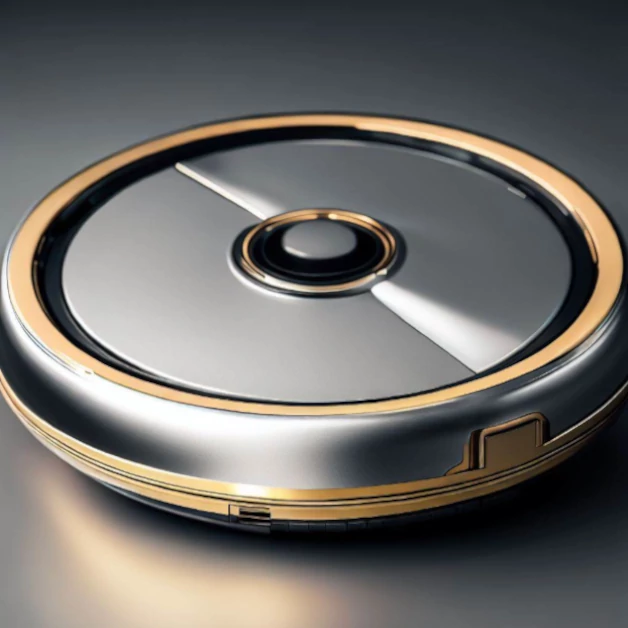Are you sick of sneezing and coughing all the time because of dust and allergens in your home? Do you want a way to clean your floors and clean the air you breathe at the same time? Hepa filtration in robot vacuums is the only thing you need to look for.
This new technology is changing the game for both allergy sufferers and people who live in their own homes.
In this article, I will talk about why hepa filtration is a must-have for anyone who wants to improve the quality of the air in their home.
Get ready to breathe easier and say goodbye for good to those annoying allergens.
Understanding HEPA Filtration

HEPA filtration is a type of pleated mechanical air filter that can remove at least 99.97% of dust, pollen, mold, bacteria, and other airborne particles with a size of 0.3 microns (m).
HEPA filters are made from random bundles of glass or synthetic fibers that are held together with up to 5% acrylic.
The HEPA filter has fibers that help catch particles of different sizes.
Particles in the air are caught by the air filter in three ways: diffusion, interception, and impact.
How HEPA Filters Work
HEPA filters work by forcing air through a fine mesh that catches allergens and irritants like smoke, dust, dirt, pollen, and pet dander that could be harmful or irritating.
The HEPA filter catches dirt and dust particles in three different ways: some particles hit the filter fibers and get stuck; other particles stick to the fibers because they have an electrostatic charge; and still others pass through the filter but hit other particles and get stuck in the process.
Types of HEPA Filters
There are six kinds of HEPA filters, which are labeled A, B, C, D, E, and F.
The U.S.
HEPA standard says that a filter must keep 99.97% of particles with a diameter of 0.3 m (micrometers).
The European standard is 99.95%.
Smaller and larger particles are filtered out even better.
In-situ testing is important to make sure that HEPA filters work well because they are all used in very important places.
True HEPA Filters
The only difference between true HEPA filters and regular HEPA filters is that true HEPA filters claim to get rid of more than 99.97% (but less than 100%) of particles.
There are no fake HEPA filters as long as they meet the minimum requirements of getting rid of 99.97% of particles at the 0.3-micron size.
Benefits of HEPA Filtration
People with asthma or severe allergies need HEPA filtration because the filters catch pollen, mold spores, fine dust, pet dander, and other bacteria and allergens.
HEPA filtration is important for cleaning up after water damage because it helps get rid of mold spores, bacteria, and other microorganisms that show up because of the water.
It also helps improve the air quality inside homes by reducing airborne pollutants.
Limitations of HEPA Filters
HEPA filters are made to get rid of particles that are at least 0.3 microns in size.
Theoretically, these filters can get rid of at least 99.97% of dust, pollen, mold, bacteria, and other airborne particles that are at least 0.3 microns (m) in size.
HEPA filters are made from a mat of glass or synthetic fibers that are arranged in a way that does not make sense.
As particles move through the filter, the fibers catch them.
But it is important to know that HEPA filters do not get rid of molecules of gas and smell.
If you want to get rid of gases and smells, look for a HEPA filter that also has an activated carbon filter.
Maintaining HEPA Filters
How Often Should HEPA Filters be Replaced?
HEPA filters that can be changed should be changed every 6 to 12 months, depending on the air quality and other factors in the environment.
But some HEPA filters can last for up to a year before they need to be changed.
If you use a HEPA filter in a business, you should change it every year.
If you use it at home, you should change it every two to three years.
It is important to change air purifier filters on a regular basis because trapped particles build up over time and make the air purifier work less well.
Depending on the air quality and the environment, carbon pre-filters should be changed every 3 months.
Permanent filters do not need to be replaced, but they still need to be cleaned from time to time to get rid of any dust that has built up.
How to Determine if Your Vacuum Cleaner has a HEPA Filter
You can check the serial number and test results printed on the filter to see if your vacuum cleaner has a HEPA filter.
True HEPA filters are given a serial number and have been shown to catch at least 99.97% of particles larger than 0.3 microns.
The standard test size is 0.3 microns because most filters work better with both smaller and bigger particles.
The fact that your vacuum has a HEPA filter should be written on the filter itself.
Some vacuums do not have HEPA filters, but a lot of Dyson vacuums do.
Even if they are not HEPA filters, Dyson filters tend to be very good.
Some Dyson vacuums have only one filter, whether it is a HEPA filter or not.
Other Dyson vacuums have two filters: one before the motor and one after it.
Having two separate filters makes it less likely that some particles will get back into your home through the vacuum.
How to Clean HEPA Filters
It is important to clean HEPA filters often to keep them working well.
But the way to clean a filter depends on whether or not it can be washed.
For HEPA filters that can be washed, run cold water over them to clean them.
It is important to keep your hands off the filter material and only let it touch water.
Before putting the filter back in, it should be completely dry after being cleaned.
On the other hand, HEPA filters that can not be washed can be cleaned by attaching a brush to a vacuum cleaner.
If you want to know how to clean a HEPA filter that can not be washed, you should check the user manual.
Other Types of Filters
It is also important to know that HEPA filters are cleaned differently than filters made of foam, pleated paper, or synthetic fibers.
Foam filters can be cleaned by putting them in water with dish soap or an all-purpose cleaner and gently squeezing them before letting them dry in the air.
Manufacturers say that filters made of pleated paper or synthetic fibers are only good for one use and should never be soaked or rinsed in water.
Some non-woven synthetic filters, on the other hand, can be rinsed a few times with water and then left to dry in the air for at least 24 hours.
HEPA filters are an important part of vacuum cleaners because they catch very small particles like smoke, pollen, and mold.
The HEPA filter in a vacuum cleaner needs to be cleaned regularly with the right tools, depending on whether it can be washed or not.
It is also important to read the user manual to find out how to clean HEPA filters that can not be washed.
By following these rules, you can make sure that the HEPA filter on your vacuum cleaner is working well and efficiently.
Benefits and Drawbacks of HEPA Filtration
What is HEPA Filtration?
High-Efficiency Particulate Air is what HEPA is short for.
To get a HEPA seal of approval, a vacuum cleaner must catch at least 99.97% of its emissions, even if they are as small as 0.3 microns.
A HEPA filter can only be used in a vacuum cleaner that was made to work with it.
A regular vacuum does not become a HEPA vacuum just because you use a HEPA bag or add a HEPA filter.
Advantages of HEPA Filtration
Dust, pet dander, and other common allergens should be kept to a minimum in homes.
HEPA filters get rid of particles by using three different ways to trap them: by impact, by interception, and by diffusion.
Some particles hit the fibers of the filter and are taken in by the impact.
Some are caught when they move too close to a fiber in the moving airstream and get caught by interception.
When moving at slower speeds, some particles hit gas molecules and spread out into the fibers.
Together, these three things let HEPA filters catch particles that are both bigger and smaller than a certain target size.
Large particles like dust, pollen, and pet dander can be caught by HEPA filters, which can help allergy and asthma symptoms.
Before the air goes through a HEPA filter and gets even cleaner, vacuum cleaners have more than one mechanical filter with a denser design to catch more particles.
These can get rid of particles as small as 0.3 microns, which is about the width of a human hair.
Limitations of HEPA Filtration
One of the biggest problems with HEPA filters is that they can not get rid of air pollutants smaller than 0.3 microns.
This includes viruses, some bacteria, and volatile organic compounds (VOCs).
VOCs are things like hairspray and ammonia that a HEPA filter can not get rid of because they are too small.
Some VOCs have long been known to cause cancer.
Another problem with HEPA filters is that they need to be replaced often.
Over time, particles get stuck in the filter and make it less effective.
To make sure the filter keeps working, it is important to follow the manufacturer's instructions for how to replace it.
Because HEPA filters are thick and dense, they can also make it hard for HVAC equipment to move air.
This can make it hard for air to move through the room, making heating and cooling systems work harder than they need to.
In-duct HEPA filters can be replaced with either HEPA filters that are outside the house or whole-house air filters.
Buying a HEPA Vacuum
If someone wants to buy a HEPA vacuum, they should do research and buy it like they would any other appliance for their home.
They should also know that having a HEPA filter does not solve all allergy problems.
The dust compartment needs to be cleaned out regularly, and the whole house, including the curtains and furniture, needs to be cleaned thoroughly.
The Importance of Multi-Surface Cleaning in Hepa Filtration Vacuum Cleaners
When it comes to vacuum cleaners with hepa filtration, multi-surface cleaning is an essential feature that cannot be overlooked.
These vacuums are designed to capture even the smallest particles of dust, dirt, and allergens, making them ideal for people with allergies or respiratory issues.
However, to ensure that these particles are effectively removed from your home, the vacuum must be able to clean multiple surfaces, including carpets, hardwood floors, and upholstery.
A vacuum with a multi-surface cleaning feature can easily transition from one surface to another, ensuring that all areas of your home are thoroughly cleaned.
This feature is particularly important for homes with pets, as pet hair and dander can accumulate on various surfaces.
Therefore, when choosing a hepa filtration vacuum cleaner, it is crucial to consider its multi-surface cleaning capabilities to ensure that your home is clean and allergen-free.
For more information:
Mastering Multi-Surface Cleaning: Vacuum TipsMastering Multi-Surface Cleaning: Vacuum Tips
HEPA Filters and Allergies/Asthma
HEPA Filtration: A Solution for Allergies and Asthma
HEPA filters are a type of air filter that can get rid of up to 99.97% of dust, pollen, and other airborne particles that are smaller than 0.3 microns.
People with asthma and allergies, which can be made worse by airborne particles, can use them to help them feel better.
The Environmental Protection Agency (EPA) says that HEPA filters are a good way to clean the air.
Benefits of HEPA Filtration
Studies have shown that air filtration reduces allergens in the air, which may help people with allergies in some ways.
Experts say that for a single room, you should use an air cleaner with a HEPA filter and check that the filter has a clean air delivery rate (CADR) that matches the size of the room.
HEPA Filters in Vacuum Cleaners
Some vacuum cleaners can also be bought with HEPA filters.
These filters catch more dust from the exhaust, so when you vacuum, less dirt and dust mites are thrown back into the room.
This can be very helpful for people who have asthma or allergies.
Portable HEPA Purifiers
Most air purifiers have HEPA filters.
These are small, portable units that may work for just one room.
A review from 2016 found that portable HEPA purifiers get rid of about 25% to 50% of the particles in the air.
A 2018 review, on the other hand, found that using an air purifier alone may not improve asthma symptoms in most cases.
The authors of the review thought that a mix of methods might help improve asthma outcomes.
Potential Risks of Air Cleaners
It is important to remember that some air cleaners can make allergies worse instead of better.
Ionic electrostatic room cleaners release ions that force particles to stick to walls or surfaces, but they do not get rid of all particles in the air.
Also, they make ozone, which is known to be an irritant.
Because of this, it is best not to buy "air purifiers" that make ozone.
People who have allergies or asthma can use HEPA filtration to help them.
Some air purifiers and some vacuums come with HEPA filters.
When using an air cleaner, it is important to make sure that the filter has a clean air delivery rate (CADR) that matches the size of the room where you plan to use it.
It is also important not to buy "air purifiers" that make ozone and to think about using more than one method to help asthma patients.
Conclusion

Hepa filtration is a big deal for robot vacuums because it makes them much better.
It not only keeps your floors clean and free of dust and allergens, but it also makes your home a healthier place to live.
As a person who owns a vacuum cleaner, you should think about buying a robot vacuum with hepa filtration so you can get the benefits that come with it.
People who want to buy one should be aware that not all robot vacuums with hepa filtration are the same.
Some may have more advanced features, better suction power, or longer battery life than others.
Before making a purchase, it is important to do your research and read reviews.
In the end, anyone who cares about having a clean and healthy home should buy a robot vacuum with a hepa filter.
It is a small but important step you can take to improve your quality of life and make sure you and your family breathe clean air.
So, go ahead and switch to hepa filtration right now.
Do not forget that a clean house is a happy house.
Looking for a new robot vacuum?
Choosing a gadget can be very difficult if you know nothing about the technology.
Some will pay for features they do not need while others may not consider what they really want.
So I created this quick, newbie guide to help you focus on what is really important to you:
The best robot vacuum for you.The best robot vacuum for you.My article on the topic:
Robo Vac 101: Benefits, Setup & CostsRobo Vac 101: Benefits, Setup & Costs

